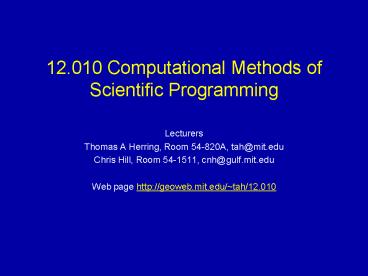12.010 Computational Methods of Scientific Programming - PowerPoint PPT Presentation
1 / 15
Title:
12.010 Computational Methods of Scientific Programming
Description:
12.010 Computational Methods of Scientific Programming Lecturers Thomas A Herring, Room 54-820A, tah_at_mit.edu Chris Hill, Room 54-1511, cnh_at_gulf.mit.edu – PowerPoint PPT presentation
Number of Views:48
Avg rating:3.0/5.0
Title: 12.010 Computational Methods of Scientific Programming
1
12.010 Computational Methods of Scientific
Programming
- Lecturers
- Thomas A Herring, Room 54-820A, tah_at_mit.edu
- Chris Hill, Room 54-1511, cnh_at_gulf.mit.edu
- Web page http//geoweb.mit.edu/tah/12.010
2
Summary
- Finished up C with structures and memory
management - Started with C
- C is C with the addition of classes
- Class is a formal way to think about good program
design. - Modularity, encapsulation, hierarchy, abstraction
- A class has
- Methods ( program logic)
- Data ( variables )
- can be private or public
- Today
- Example class in an example
- Inheritance
- Overloading (allows re-definition of methods for
certain classes)
3
Application Example
Throwing a ball in the air
Get initial velocity and length of
experiment. Calculate time evolution of w and
z. Print out trajectory
z
w0
z0
4
C Procedural Form
- main ( )
- float t10. float w010.
- t_gball theBall/ Stats for the ball
/ - / Allocate space for full ball time history /
- createBall(w0, theBall )
- / Step forward the ball state /
- stepForwardState( t, theBall )
- / Write table of output /
- printTrajectory( t, w0, theBall)
5
C Using Ball Class
- main()
- float w0 10. float t10.
- Ball b
- b.initialize(w0)
- b.simulate(t)
- b.printTrajectory()
- All info. is held in b. Fewer args, cleaner
abstraction.
6
C Procedural Form
- main ( )
- float t10. float w010.
- t_gball theBall/ Stats for the ball
/ - / Allocate space for full ball time history /
- createBall(w0, theBall )
- / Step forward the ball state /
- stepForwardState( t, theBall )
- / Write table of output /
- printTrajectory( t, w0, theBall)
7
C Using Ball Class
- main()
- float w0 10. float t10.
- Ball b
- b.initialize(w0)
- b.simulate(t)
- b.printTrajectory()
- All info. is held in b. Fewer args, cleaner
abstraction.
8
Inheritance
- Want new class uString. Like String except that
the strings will be converted and stored in upper
case. e.g.
String
uString
set() s()
set() s()
uString s s.set(Hello) printf(s\n,s.s()) ?
HELLO
String s s.set(Hello) printf(s\n,s.s()) ?H
ello
9
uString extends String
- No need to write uString from scratch.
- Inherit most code from String.
- Extend Stringset to capitalise.
- A uString is a String with some extra feature.
String
Base class
set() s()
uString
Derived class
10
C Inheritance Example
- New interface for uString
- / Extend String class to uString /
- / uString stores strings as upper case /
- class uString public String
- public
- void set( char ) / Set a uString /
11
uString set method
- / Set str to point to a private copy of s /
- void uStringset(char s)
- int i
- Stringset(s)
- for (i0iltstrlen(s)i)
- if ( stri gt 'a' stri lt 'z' )
- stri toupper(stri)
Base class method
protected (not private)
12
uString in action!
- main()
- String s1
- uString s2
- printf("Executable code starting\n")
- s1.set("Hello")
- printf("s\n",s1.s())
- s2.set("Hello")
- printf("s\n",s2.s())
- printf("Executable code ending\n")
13
Overloading
Can redefine operators e.g. to operate on
classes e.g.
coord
() ()
coord p1, p2, p3 p3 p1 p2 This would then
do ?if p1p2(1,1,1) p3 (2,2,2)
14
Overloading
- Have to define the meaning of and for a coord
class object. Language defines meaning for
integer, float, double etc but now we can define
extra meanings.
coord coordoperator (coord c2) coord temp
temp.cx cx c2.cx temp.cy cy c2.cy
temp.cz cz c2.cz return(temp)
class coord public coord operator(coord
) private int cx int cy int cz
15
Conclusion
- C and C Characteristics similar to Fortran
Core program languages which are very powerful
but programmer needs to do much of the work - Libraries of routines can be made and are
available but these need to be carefully designed
in C and Fortran (potentially routines can cause
problems) - C classes minimize some of these problems but
do not eliminate them completely. - Good modular program design can minimize
problems. - Remainder of class Examine C examples and
contrast Fortran and C if time available (see
link on class web page)C_Basics.html
C_Fortan_compare.html C_Pointers.html - Homework 3 has been posted to web site (Due
November 4, 2010)































